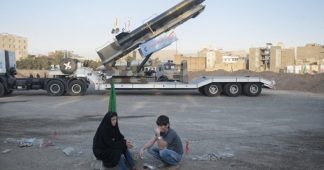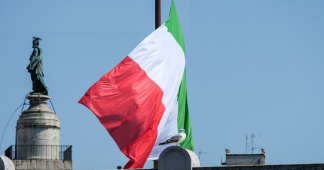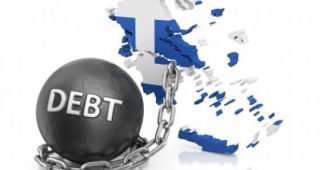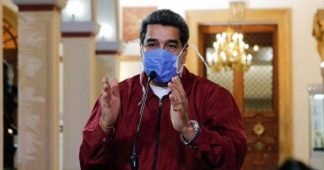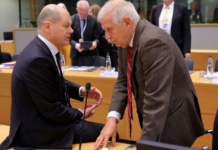London is using their money to buy technically disastrous aircraft and useless nuclear missiles while encouraging flag-flying from public buildings.
By Brian Cloughley
March 30, 2021
The United Kingdom is in a dire condition, socially and economically, and as with other countries has a major crisis on its hands in having to fight to counter the Covid 19 epidemic which has caused some 126,000 recorded deaths. This is the highest number per capita in the world. With a population of about 66 million the UK is fifth on the global list, with the U.S. (population 330 million) in top place followed by Brazil (212 million), Mexico (128 million) and India (1.3 billion). Certainly the UK has been energetic and indeed successful in arranging for virus vaccination, but that is an example of closing the door too late, as the grieving relatives and friends of 126 thousand dead people would testify. Unfortunately, however, the tragedy has not affected the government’s campaign to whip up nationalist fervour which has persuaded many voters that the death record is the fault of everyone except the UK.
In this new era of “Global Britain”, which has sparked unhealthy and markedly immature displays of artificial national pride, the government’s emphasis is on endeavouring to rouse and inflame patriotic enthusiasm for as many causes as it can dream up. It all brings to mind the saying of the English author, essayist and littérateur Doctor Samuel Johnson who observed some 250 years ago that “patriotism is the last refuge of a scoundrel” by which his intention was to criticise “false patriots” who acted hypocritically in pursuit of their dubious objectives. And it would be fascinating to know what he would make of the vulgar fandangos of today’s pseudo-patriots who appear to be breeding quickly.
One of the latest examples of manufactured patriotism is the decision of the government in Westminster to have the national flag, the Union Jack, flown from public buildings every day, because that will act as “a proud reminder of our history and the ties that bind us”, according to one of the many ministers in the absurdly-named “Department for Digital, Culture, Media and Sport”. It was explained in the department’s press release that “our nation’s flag is a symbol of liberty, unity and freedom that creates a shared sense of civic pride”, and that “the Government has also cut red tape to allow dual flagging – where two flags can be flown on one pole. Where organisations have two flag poles, they can fly the Union flag alongside another flag.”
Britain is deep in an economic recession with, for example, “the embattled retail industry facing 200,000 job cuts in 2021 after 320 shops closed every week in 2020 in the worst year for the High Street in a quarter of a century… It comes after a staggering 180,000 jobs in the retail sector — 320 stores a week — were axed last year, leaping by a quarter on 2019.” But the Department for Digital, Culture, Media and Sport can still find time, energy and large sums of money to indulge in foolish flag-waving strategies that coincide with announcement by government of publication of its “Integrated Review of Security, Defence, Development and Foreign Policy.”
This document complemented the Defence Minister’s report to Parliament titled ‘Defence in a Competitive Age’ which identified supposed foes whose non-existent threat to Britain could be used to justify military expenditure which would in some strange fashion feed the fires of patriotism. At the top of the list is the Russian Federation which, according to the UK’s defence minister “continues to pose the greatest nuclear, conventional military and sub-threshold threat to European security. Modernisation of the Russian armed forces, the ability to integrate whole of state activity and a greater appetite for risk, makes Russia both a capable and unpredictable actor.” There was no mention of the fact that Britain spends 61.5 billion dollars a year on its military, which is more than Russia, a country with double the UK’s population and seventy times its size.
In his preamble to the Paper the defence minister reiterated that in this time of desperate economic stringency the prime minister, Boris Johnson, had made a “commitment to spending £188 billion on defence over the coming four years — an increase of £24 billion or fourteen per cent.” This pledge came at a moment when many voters were extremely upset that the government had decided to allocate an insultingly trivial one per cent pay rise to the 1.5 million nurses and medical care staff who are in the front line of the nation’s fight against the pandemic, at a total cost of half a billion a year.
In spite of its enormous economic problems, the UK has committed to purchase 138 F-35 attack aircraft from the United States and so far has ordered 48, each one costing 80 million pounds, totalling almost four billion pounds, so it is not surprising that Johnson and his team of war drum-bangers have decided to climb to the high ground of pseudo-patriotism to try to deflect attention from gross waste of money during a national crisis.
And one of the methods they thought might attract voter support was to announce an increase in the number of submarine-launched Trident nuclear missiles from 180 to 260. Nobody knows how much this will cost, and the national response was at best lukewarm, as there did not appear to be strategic justification for the change of course from support of nuclear disarmament to growth in warhead numbers. When asked why the UK was taking such action the government spokesperson said that “In recent years, we have seen nuclear armed states ignore international norms. It remains the case that we believe the best way to protect ourselves and our Nato allies is to make sure we have a credible nuclear deterrent.”
It has not been explained how Britain’s increase in nuclear weapons is going to deter anyone, and as indicated by Harvard’s Professor Serhii Plokhy (whose book Nuclear Folly: A New History of the Cuban Missile Crisis is to be published in April) “despite all the changes around the globe since the end of the cold war, there are still two nuclear superpowers: Russia, with approximately 4,300 warheads, and the U.S., with an estimated 3,800 warheads. Eighty additional Trident warheads will not make much of a difference.”
The only difference will be in the emptying pockets of the British people, who have been hoping that government priorities would include decent pay for health workers and as well-balanced a budget as can be arranged in this time of economic chaos. But the regime in Westminster is using their money to buy technically disastrous aircraft and useless nuclear missiles while encouraging flag-flying from public buildings. Doctor Johnson was absolutely right when he said that patriotism is the last refuge of a scoundrel.
Published at www.strategic-culture.org
